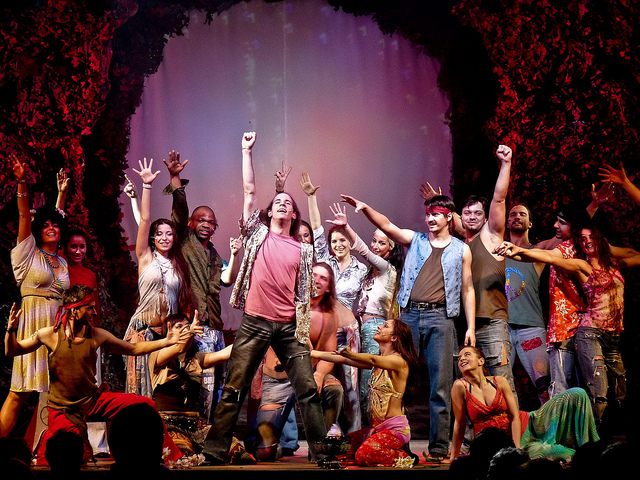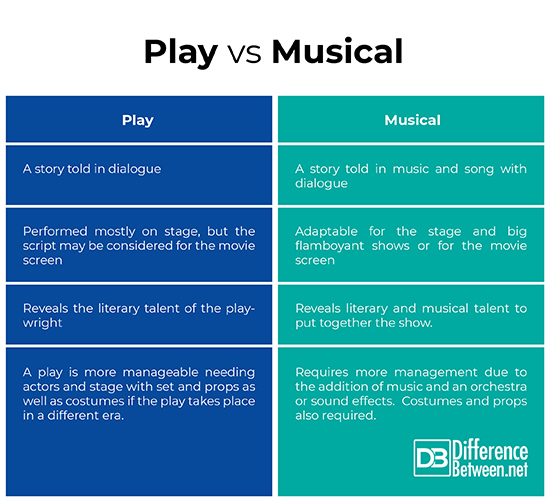Difference Between Play and Musical
There is one very distinctive differences between a play and a musical. A musical will always have music and the story is told through the music. A play tells a story, usually on stage or on a screen, using dialogue. A musical tells a story with dialogue and music. A play, usually known as a straight play, may have music in the action, but the music does not actually tell the story. The purpose of the music in a play is to enhances the story or the scene at the time. A musical has different genres, but the music in the musical is part of the story telling. Therefore, a musical can be a play with music, but a play cannot be a musical, in the true sense of the word. The musical has become a popular choice of entertainment with music and dancing. There are some musicals that do not have any dialogue as the entire story is told through the songs. Evita and Les Misérables are epic musicals that do not have any speaking, only singing and music. The Opera is another form of musical and a genre of musical entertainment that reaches an audience who appreciates this original form of musical drama. Other musicals come in the form of Jukebox musicals based on pop music and appealing to wider variety of audiences. These musicals encourage a mixture of art forms from music and dancing to the set design costume design lighting and they are well thought of on the stage and on the screen.
What is a Play?
A play is a form of literature, usually written by a playwright. A play tells a story through dialogue and sometimes will include a narrator, who takes the part of the story teller. A play usually takes place on the stage and is known as a straight play because it is performed from a script of dialogue. A play my include music, but the music is not the means of communicating the story. There are different types of plays ranging from comedy to satirical drama and tragedy. Each form of play is known for the category it fits into. Shakespeare, the well- known sixteenth and seventeenth century playwright wrote all these forms of play. He wrote, in his play called Hamlet,
‘The play’s the thing,
To catch the conscience of the king.’
Shakespeare used a play within a play to further his plot and add to the intrigue.
A play serves the following purposes:
- Entertainment on the stage and the storyline for motion pictures.
- A form of literary writing studied at schools and universities.
- A creative way to express tragedy, comedy, satire and other forms of literature.
What is a musical?
A musical is a story told through music. A musical may have a script for the spoken word, but the essence of the story is told through the words of the songs. A musical can be presented in the form of an opera or a pop musical show with pop tunes. Musicals are popular as movies because they incorporate many different art forms. The variety of talent is appreciated by many different audiences. Great awards are given for musicals and screen productions at the Oscars and other annual award shows. Musicals are generally uplifting and enjoyed for their lighter look at drama. Musicals encourage multi-talented actors and actresses to take part in the musical show.
Musicals are appreciated for the following reasons.
- They are an artistic presentations of music, dance, and drama.
- A musical has a script that can be the method of telling the story as well as the words of the songs.
- A musical combines other art forms like set design, lighting, music and song as well as acting.
Difference between Play versus musical
-
Function:
The play tells a story through the dialogue of the actors while the musical tells a story through the music and the singing.
-
Composition:
There is more variety of performing arts evident in a musical and more opportunity for artists of different types to become involved in a musical. A play will tell a story, but as a straight play will not have the mixture of different artistic skills evident.
-
Differing art forms.
A play brings out the literary talent of a playwright. A skillful use of words and dialogue make a play appealing from a literary point of view. A musical relies on a combination of talents from the script writer to the musical director and the set and costume designer.
Play versus musical: Comparison Chart
Summary of Play versus musical
- A play and a musical have their roots in entertainment and performing on the stage or a screen production.
- A play, known as a straight play cannot be a musical but a musical usually has a dialogue or script that tells the story. Some musicals tell the story purely through the music and the songs used throughout the performance.
- A musical creates more opportunity for the performing arts and their related art forms such as set production, musical scores, orchestral contribution, costume design and ultimately an opportunity to record a movie that will serve as entertainment around the world.
- Difference Between Lagoon and Bay - October 20, 2021
- Difference Between Futurism and Preterism - August 12, 2021
- Difference Between Dichotomy and Paradox - August 7, 2021
Search DifferenceBetween.net :
Leave a Response
References :
[0]Potter John. What’s-the-difference-between-a-musical-and-a-play. www.thestage.co.uk/advice2015/dear-wesrend-producer. June 30th, 2015. Viewed 05/08/2018.
[1]Pesner Ben. Theatre development July09/2012.play versus musical.www.theatredictionary.tdf.org/defining theatre terms viewed 05/08/2018
[2]Tucker hoy Logan. Play versus musical. www.theodysseyonline.com/Sept 05/2016 viewed 05/08/2018
[3]Image credit: https://www.flickr.com/photos/mgeartworks/10184308833
[4]Image credit: https://www.flickr.com/photos/eaglebrook/16249602140



